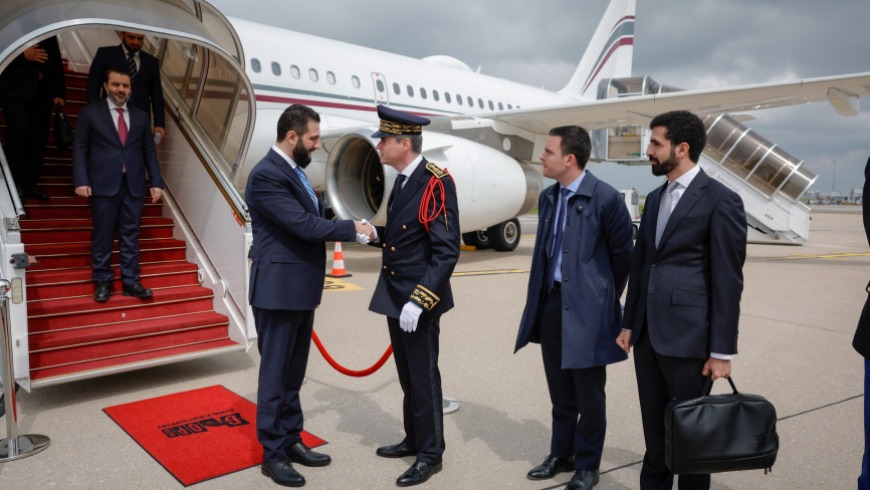In a visit charged with symbolism, calculation, and unresolved tensions, Syrian President Ahmad al-Sharaa arrived in Paris today for his first official trip to a European capital since the fall of the Assad regime in December 2024. Invited by President Emmanuel Macron, the visit marks a pivotal moment in Syria’s re-emergence onto the world stage—but also exposes the hard choices both Damascus and its European counterparts must confront.
From Isolation to Engagement: A Fragile Opening
The French presidency confirmed that Macron would reaffirm his country’s support for a “free, stable, and sovereign Syria that respects all components of Syrian society.” President al-Sharaa, accompanied by Foreign Minister Asaad al-Shibani and Emergency and Disaster Response Minister Raed al-Saleh, is set to hold discussions at the Élysée Palace this evening focused on a packed agenda: sanctions relief, reconstruction aid, the future of minorities, counterterrorism, and the removal of foreign fighters from Syrian military structures.
But behind the cordial reception lies over a decade of hostility. Since the start of the Syrian revolution in 2011, France stood at the forefront of efforts to isolate Bashar al-Assad’s regime. It closed its embassy in Damascus in 2012, championed EU sanctions, and backed UN Resolution 2254 as the only legitimate path to political transition. France nearly joined the U.S. in military intervention after the 2013 Ghouta chemical massacre, and did participate in joint strikes following the 2018 Douma attack.
A Decade of Firm Principles and Shadow Channels
Despite its principled stance, France also navigated complex contradictions in its Syria policy. In parallel with its public condemnation of Assad, French intelligence services reportedly engaged in discreet cooperation with their Syrian counterparts to address mutual threats posed by ISIS and other jihadist networks. In 2015, intelligence-sharing channels were re-established, though carefully distanced from any political endorsement of Damascus. France also deepened cooperation with Kurdish-led forces in northeastern Syria, bypassing the Assad regime entirely.
Yet France has remained unequivocal: “No legitimacy, no reconstruction, no normalization” without tangible political reform. This stance has stood firm even as Arab states, notably the UAE and Saudi Arabia, restored relations with Damascus. President Macron’s invitation to Sharaa does not signal an abandonment of this principle—but rather a recalibrated opportunity to test the intentions of Syria’s new leadership.
Syrian Ambitions, European Demands
For Sharaa, the visit is part of a broader strategy of “zero problems” with the world—a doctrine he has repeated since assuming power. His administration seeks the lifting of Western sanctions, re-entry into global markets, and international support for national reconstruction. Speaking to Al-Araby Al-Jadeed, analyst Ahmad al-Qurabi said the visit reflects a “strategic necessity” for Syria, which is attempting to distance itself from Russia and reposition itself diplomatically after years of isolation.
But France remains clear-eyed. Foreign Minister Jean-Noël Barrot stated hours before Sharaa’s arrival that Paris “will not issue a blank cheque,” stressing the need for accountability, justice, and structural reform. He demanded answers regarding chemical weapons, justice for atrocities in Suweida and the coastal regions, and concrete action to dismantle the influence of extremist groups in Syria’s new military institutions.
France is also watching Syria’s handling of minority rights closely. Officials are expected to push Damascus to expand political participation for Alawites, Druze, and Kurds—particularly after the Syrian government signed a cooperation agreement in March with the Syrian Democratic Forces (SDF).
Symbolism and Misplaced Obsessions
The visit has not been without controversy. Critics—many remnants of the Assad-era establishment or radical opposition factions—have attempted to diminish its significance by focusing on symbolic minutiae, from the length of the red carpet to social media speculations on diplomatic gestures. Political protocol expert Dr. Mohammad Issam Maho emphasized that France, like the U.S., rarely applies full ceremonial honours for visiting heads of state, and that such details should not obscure the political weight of the moment.
Syrian journalist Mohammad Salloum echoed this view, urging the public to move beyond the “obsession with legitimacy” and focus instead on outcomes: “What agreements were signed? What sanctions were lifted? Which sectors benefited? That is what matters.” He warned against mistaking optics for substance in assessing the country’s progress.
A Relationship Scarred but Not Broken
The scars of the past decade are profound. France led the charge for EU sanctions that crippled bilateral trade, which fell from hundreds of millions of euros to just $22 million by 2023. French giants like Total and Lafarge exited Syria—Lafarge, controversially, amid revelations it had paid ISIS for protection. Simultaneously, France championed judicial accountability: in 2024, a French court convicted three senior Syrian officials in absentia for crimes against humanity. High-profile figures such as Rifaat al-Assad also faced corruption probes.
Yet now, with Assad gone, France sees a window to reassert strategic influence in Syria—economically, diplomatically, and politically. As Radwan Ziadeh noted, the visit may “open important doors at the European and international levels,” especially in relation to sanctions relief and reconstruction aid.
Conditional Rapprochement
Ahmad al-Sharaa’s visit to Paris is neither a full embrace nor a polite handshake—it is a test. For Syria, it is a chance to prove that it has turned a page. For France, it is an opening to nudge the new Syrian government toward accountability and inclusion, without abandoning its core principles.
If successful, the visit could set the tone for cautious re-engagement with the broader European bloc. If not, it may only reaffirm that symbolic diplomacy must still be backed by political will—and concrete reform.


